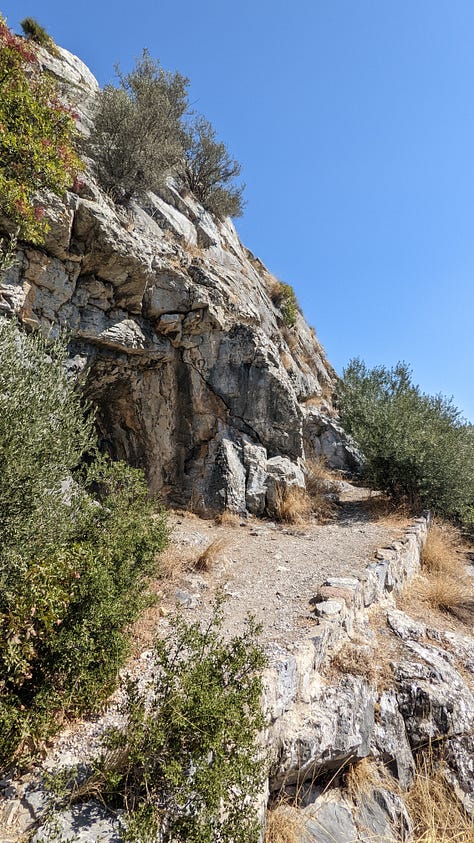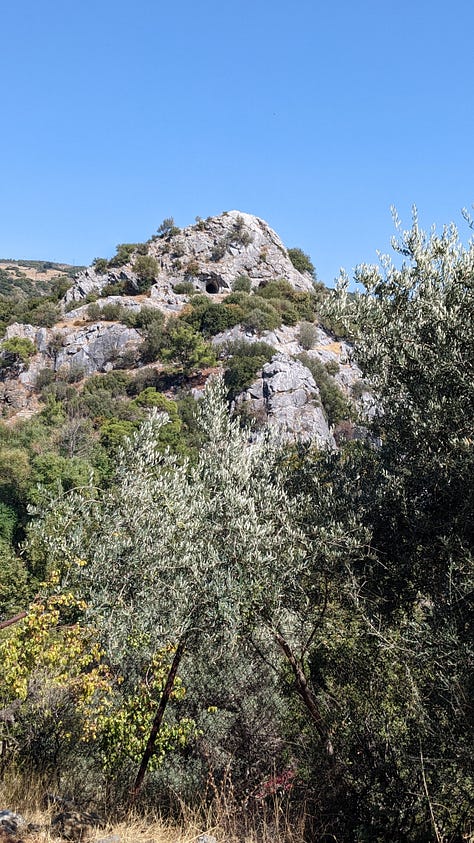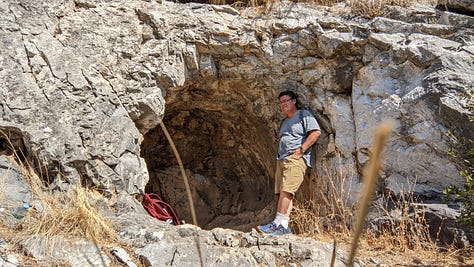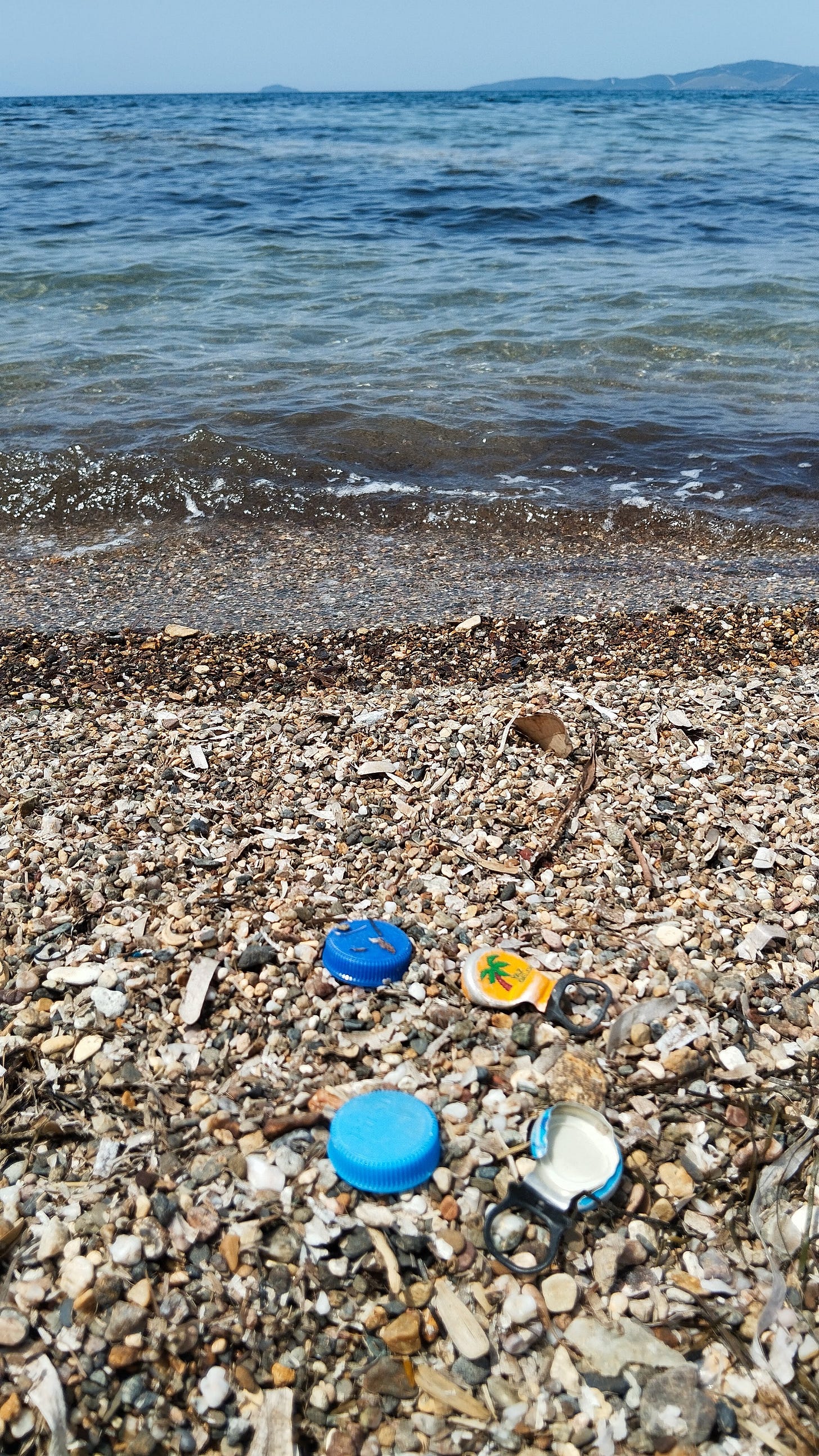Aegean Tale: Homeros & the Three Wishes
Part 1: A true visit to the Homeros Vadisi (Homer Cave) in the hills above Izmir led to this tale.
Whenever people ask me what brought me to Izmir, I like to say, “Homer brought me here.”
That’s how I felt in 1999 when, working as an aid worker in Albania during the NATO-Serb War, I was given a 1-week R&R and asked to select a destination within 400 miles.
Izmir. It had to be Izmir: the birthplace of Homer, the nearest major city to the site of ancient Troy. The Iliad had been composed here. It was a city on the Aegean, the sea whose “wine-dark waters” propelled the greatest odyssey ever told.
Years later, in 2022, I accepted a job in Izmir. I would teach high school literature – Homer, among other writers. I couldn’t resist. I moved to Türkiye on August 4, one of the hottest days of the summer.
A few weeks later, I laced up my hiking boots to make a pilgrimage to Homeros Vadisi, the Homer Cave, in the hills above the suburb of Bornova.
Izmir was a different place in the 8th Century BCE, when Homeros, as he is called in this region – his homeland – composed and sang. “Old Smyrna,” as it is known today, lay close to the water at the end of the bay. The cave, as I would learn, certainly does not.
I took the bus from the Metro station in Bornova. It climbed a steep hill to the town of Eğridere. From the bus stop, I walked about 3 km down a winding road to the cave site. It lay at the entrance to a public recreation area: next to an outdoor cafe and across a cobble-stone parking lot from a paintball course.
It was hot. Well above 30 degrees. I stopped at a market and bought water. Two bottles: one to drink now, and one to carry with me. A row of metal dumpsters lay near the trail entrance. I drank the first bottle quickly, squeezed the cap, slipped it through the plastic mouth, and threw the bottle away.
The hike from the parking lot to the cave was about 150 meters, up a gravel path to a series of 3 caves in a great gray rock. Most of the pathway climbs, and while the parking area and the park below the rock are shaded, bright sun beat down upon me as I approached the famous caves, a sight where literary luminaries such as Byron had once paid their respects.



The caves were a disappointment to me, a teacher who has spent more time than most people imagining the man who compiled the epics, The Iliad and The Odyssey. Homeros was no neolithic figure, living in a cave and etching his masterpieces into stone tablets. He lived in Iron-age Ionia, where writing had been rediscovered after a “dark age” of illiteracy – and he recorded tales which had originated around the time of the Fall of Troy, had endured 300 years and had been sung ever since.
Another disappointment to me was the sight of so many discarded plastic water bottles along the path to the caves. After my first climb, I fished a plastic bag out of one of the metal dumpsters and retraced my steps, picking up discarded water bottles as I walked and stuffing them into my backpack.
I’m not sure when I started the habit of placing the caps inside empty water bottles. Perhaps it was after visiting Yoncaköy Plaj, a remote beach that was strewn with more plastic bottle caps than seashells. I want to keep small pieces of plastic from polluting the world. I wanted to honor the greatest writer of all time. That’s why I cleaned up the homesite of Homeros. And that is why I uncapped every bottle I collected, squeezed the cap in half, and slipped it inside the bottle.
The last bottle I took from the bag looked like all the others. It was clear inside; it weighed the same as the other empty bottles. But when I took off the cap, a vapor poured out, gathering in clouds, first above and then surrounding me. I could no longer see the path to the caves, or the cafe, or the paintball course.
The cloud grew dark and cold. A figure appeared: of normal height, middle-aged, a bearded man with light, gray eyes and a slight paunch in his tummy. Homeros! His beard was thinner than it looked in the statues. His eyes had laughter lines at the corners, and his cheeks were creased with long dimples.
The figure took a deep breath, exhaled, and smiled. “It’s good to be Homeros!” he exclaimed.
I grinned.
“Thank you for releasing me.” He stretched his arms and twisted his shoulders, adding, “Sometimes you take a drink, and sometimes the drink takes you!”
I looked around to make sure I wasn’t dreaming. I could still see the paving stones at my feet, but a cloud surrounded me. The only light came from the uncapped bottle I held in my hand.
“You know what this means,” the poet continued. He grinned and raised an eyebrow.
I had read enough Turkish tales to know about genies and the wishes they granted those who released them from confinement.
“You’re Ionian Greek,” I replied. “Not Persian or Arab.” I knew of no Greek myths that involved genies or wishes.
“I am Turkish now,” the figure replied with a wink. “That means I’m a little bit of everything. And I want to give you three wishes.”
Honestly, I have been in thrall to Homeros for 30 years. Just chatting with him outside the Homeros Caves – his caves – was something I might have wished from some other literary genie. Now, I was talking with the writer himself, the creator of worlds that had long fascinated me.
The First Wish
“OK,” I said. “I wish for five million dollars. That should be enough to let me live comfortably for the rest of my days.”
Homeros frowned. “What is a dollar?” He put his arm around my shoulders. “You need to work with me, here,” he said. “I can’t grant something that I don’t know.” He tapped his forehead with a finger, “Or something I haven’t seen for myself.”
“Do you like horses?” he continued, “or chariots? How about armor? I’m particularly good with armor, and…” He paused and grinned, “how about a beautiful woman? Would you like one of those?”
I understood. Things that Homer had seen. Places he had been. Weapons, battles, caves, tapestries. I could work with this.
“OK,” I replied. “Take me to Troy. Let me experience the battle as it played out – let me see Hector with my own eyes.”
He grinned. “Now you’re talking.” There was an opening in the clouds around us. I walked through it with Homeros, his hand still on my shoulder.
We stepped into the middle of a wide plain. A breeze poured in from the sea, and I could see hills in the distance.
Suddenly the air was cleft with the clattering of wheels and the galloping of horses’ hooves. I fell to the ground as the wheels passed centimeters from my feet. A flash of golden armor and a piercing war whoop. A shield mounted on the side of the car.
I looked at my guide. “Achilles?”
He smiled. “You fell for it too, just like the Trojans.
“Patroclus!” I exclaimed. “God, I love this scene.”
I looked to my right. Hundreds of soldiers approached in the wake of the chariot, running towards battle. I was surprised by their motley appearance. There were no uniforms. About half of the warriors wore helmets. Armor of different styles & colors covered shins, chests, and midsections. Half of them carried spears, others were archers, a few even stopped to pick up heavy stones for the attack.
“Don’t worry, you’re safe,” Homeros whispered. He helped me up, and we began to jog along the Achaean attackers. “They can’t see us, nor can they hit us with a weapon.”
“They could knock us down,” I replied, dusting myself off from my fall.
“You’re right about that.”
I scanned the attackers, looking for any heroes I might recognize. “I see Ajax,” I told my guide, pointing toward a giant man, a head taller than any other, running close behind Patroclus’s chariot.”
“Bulwark of the Acheans!”
“I think I see Agamemnon,” I continued. “He has a gleaming helmet, and a long, blue, horsehair crest.”
“That’s him. His brother should be nearby.”
I spotted a red beard jutting out below a bronze helmet.
At that moment a loud cry lashed the attackers, a thousand voices cheered as one. The Trojan army stood its ground at a place before the river, where two hills narrowed the martial plain.
This was a great army! Every soldier wore a red tunic, a thick leather belt, and bronze guards on the chests and shins. An officer whose helmet bore a red crest, rode a horse back and forth behind the line, exhorting his troop with a distinct, deep voice. Hector. He descended as Patroclus approached with the Achaean vanguard.
Patroclus’s chariot slammed into the Trojan line with a great crash. He was quickly surrounded and for a few moments, until Ajax and other warriors arrived on the scene, he was at the center of a scrum of screaming, slashing, falling soldiers.
Soon after the Achaean vanguard arrived, however, I noticed Patroclus’s chariot break through the Trojan line and rush onward the walls of the city beyond. He was tracked by every soldier on the battlefield: retreating Trojans and on-rushing Greeks.
We reached the walls of Troy, wide, built at a steep angle. Patroclus had leapt from his chariot and had started climbing the wall. The battlements above him were crowded with defenders shooting arrows and pelting him with stones.
At the city gates, Hector collected his troops and pushed back against the Achaeans. I scanned the battlements at the top of the wall. They were crammed with defenders, but I spotted some civilians among them, a few women with their hair covered and faces veiled, and a group of old men in embroidered robes.
There was a cry at the base of the wall. Patroclus had fallen. The fighters drew back for a moment, and I saw him rise. His helmet had fallen off, and his long, black curls fell freely around his shoulders. His skin was pale. He raised a sword and charged at a group of confused Trojan soldiers.
I looked around the battlefield and saw the red crest of Hector’s helmet moving towards the place Patroclus had fallen – the place where he continued to fight, the place where he fell – knocked off balance by a thrust from a Trojan warrior – then impaled by Hector’s spear.
There was another cry, a wail from the Greek forces. A scuffle broke out around the place Patroclus had fallen, but it abated and the Achaean attackers retreated from the death-dealing walls. Ajax carried a corpse in both arms, its black hair hanging over one elbow.
Hector arose on his horse again. He held above his head a gleaming bronze helmet and breastplate. Achilles’ armor, stripped from Patroclus’ corpse. The Trojans didn’t follow them across the plain. The great gate opened, and they filed into their city, assisting the wounded, carrying the dead.
Homeros and I didn’t follow. Instead he led me to a small door at the base of the city wall. My guide spoke to the door: “The wrath of Achilles.” It opened magically. He beckoned with an outstretched arm. “Welcome to Troy,” he said.
I walked through the door.
You can read Part 2 of the tale here.




